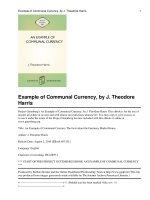Project Gutenberg''''s An Example of Communal Currency, by J. Theodore Harris doc
Bạn đang xem bản rút gọn của tài liệu. Xem và tải ngay bản đầy đủ của tài liệu tại đây (497.23 KB, 213 trang )
Project Gutenberg's An Example of Communal
Currency, by J. Theodore Harris
This eBook is for the use of anyone
anywhere at no cost and with
almost no restrictions whatsoever. You may
copy it, give it away or
re-use it under the terms of the Project
Gutenberg License included
with this eBook or online at
www.gutenberg.org
Title: An Example of Communal Currency
The facts about the Guernsey Market House
Author: J. Theodore Harris
Release Date: August 2, 2010 [EBook
#33331]
Language: English
*** START OF THIS PROJECT GUTENBERG EBOOK
AN EXAMPLE OF COMMUNAL CURRENCY ***
Produced by Barbara Kosker and the Online
Distributed
Proofreading Team at
(This file was
produced from images generously made
available by The
Internet Archive/American Libraries.)
LONDON SCHOOL OF
ECONOMICS AND
POLITICAL SCIENCE
AN EXAMPLE OF
COMMUNAL
CURRENCY
By
J. THEODORE
HARRIS, B.A.
With a Preface by
SIDNEY WEBB, LL.B.
1/- NET
LONDON
P. S. KING & SON
ORCHARD HOUSE,
WESTMINSTER
1911
PEOPLE'S BANKS
A RECORD OF SOCIAL
AND ECONOMIC
SUCCESS
By H. W. WOLFF
Third Edition, Newly Revised and
Enlarged
Demy 8vo, Cloth, 600 pp. 6s. net
The Two Aspects of the Question, Credit to
Agriculture, The "Credit
Associations" of Schulze-Delitzsch,
Raiffeisen Village Banks,
Adaptations, "Assisted" Co-operative
Credit, Co-operative Credit in Austria
and Hungary, The "Banche Popolari"
Italy, The "Casse Rurali" of Italy, Co-
operative Credit in Belgium, Co-
operative Credit in Switzerland, Co-
operative Credit in France, Offshoots
and Congeners, Co-operative Credit
in India, Conclusion.
"We may confidently refer those who
desire information on the point to the book
with which Mr. Wolff has provided us. It
will be a most useful thing if it is widely
read, and the lessons which it contains are
put in practice."—Athenæum.
"The book is the most systematic and
intelligent account of these institutions
which has been published."—Banker's
Magazine (New York).
"It is the most complete book on the
subject."—Mr. G. N. Pierson, late Dutch
Prime Minister and Minister of Finance.
"There was manifest need of just such a
book A mine of valuable
information."—Review of Reviews.
"This is an excellent book in every
way, and thoroughly deserves the careful
attention of all who are concerned for the
welfare of the people."—Economic
Review.
LONDON: P. S. KING &
SON
ORCHARD HOUSE,
WESTMINSTER
STUDIES IN ECONOMICS AND
POLITICAL SCIENCE
Edited by the Hon. W. PEMBER
REEVES,
Director of the London School of
Economics
No. 21 in the Series of Monographs by
Writers connected
with the London School of Economics and
Political Science
AN EXAMPLE OF
COMMUNAL
CURRENCY
AN EXAMPLE OF
COMMUNAL
CURRENCY:
THE FACTS ABOUT THE
GUERNSEY MARKET
HOUSE
COMPILED FROM ORIGINAL
DOCUMENTS
BY
THEODORE HARRIS, B.A.
With a Preface by
SIDNEY WEBB, LL.B.
LONDON
P. S. KING & SON
ORCHARD HOUSE,
WESTMINSTER
1911
CONTENTS
PAGE
Preface vii
Introduction 1
CHAP.
I.
Constitution
of Guernsey
4
II.
The Security
of the Notes
6
III.
Municipal
Enterprise—
The Issue of
the Notes
9
The Utility of
IV. tne Notes 20
V.
First
Rumblings of
Opposition
25
VI.
The Reply of
the States
30
VII. The Crisis 45
VIII. The End 55
Conclusion 59
Appendix 61
PREFACE
Those who during the past thirty or
forty years have frequented working men's
clubs or other centres of discussion in
which, here and there, an Owenite
survivor or a Chartist veteran was to be
found, will often have heard of the
Guernsey Market House. Here, it would
be explained, was a building provided by
the Guernsey community for its own uses,
without borrowing, without any toll of
interest, and, indeed, without cost. To
many a humble disputant the Guernsey
Market House seemed, in some mysterious
way, to have been exempt from that
servitude to previously accumulated
capital in which the whole creation
groaneth and travaileth. By the simple
expedient of paying for the work in
Government notes—issued to the
purveyors of material, the master-
workmen and the operatives, accepted as
currency throughout the island, and
eventually redeemed out of the annual
market revenues—all tribute to the
capitalist was avoided. In face of this
successful experiment, the fact that we, in
England, continued to raise loans and
subject ourselves to "drag at each remove
a lengthening chain" of interest on public
debt, often seemed so perplexingly foolish
as to be inexplicable, except as the
outcome of some deep-laid plot of "the
money power."
When first I heard of this Guernsey
Market House, as in some mysterious way
exempted from the common lot, I was
curious to enquire what transaction had, in
fact, taken place in an island which was,
after all, not so far removed in space or
time from the Lombard Street that I knew.
In all the writings of the economists (for
which my estimate was at that time, as
indeed it is now, such as I could not easily
put into appropriate words), I found no
mention of this Phœnix among market-
houses. I fear that, too hastily, I dismissed
the story as mythical.
Now Mr. J. Theodore Harris—having, I
suspect, a warmer feeling for the incident
than he has allowed to appear in these
scientific pages—has done what perhaps I
or some other economic student of the
eighties or nineties ought to have done,
namely, gone to Guernsey to dig up, out of
the official records, the incident as it
actually occurred. What is interesting is
that he has found that the myth of the
veteran Owenite or Chartist is, in all
essentials, confirmed by the documents.
The story is true. The Guernsey Market
House was built without a loan and
without the payment of interest.
It does not follow, however, that it was
any more built without the aid of capital,
than was St. Paul's Cathedral or the
Manchester Ship Canal. Mr. Harris,
contenting himself with the austerely exact
record drawn from the documents, does
not indulge in any speculative hypothesis
as to who provided the capital, or who
bore the burden that would otherwise have
been interest. Let me use the fuller
privilege of the preface-writer, and supply
some hypothetical elucidations.
What the Guernsey community did was
that which nearly every community has
done at one time or another, namely, issue
paper money. The part of the story that we
do not know is (a) what thereupon
happened to the aggregate amount of
"currency" of all kinds then in circulation
within the island, in relation to the work
which that currency had to do; (b) what
happened to the prices of commodities.
It may well have been that the issue of
paper money was promptly followed by
some shipments of metallic money to
England or France—perhaps even in
payment for imported materials for the
market house—so that the aggregate
amount of "currency" in the island was not
in fact increased. Accordingly, no change
of prices may have taken place. In such a
case, Guernsey would merely have
substituted paper for gold in its currency.
The gold-capital heretofore in use as
currency, and there, of course, yielding no
capitalist any toll of interest, would, in
effect, have been borrowed to expend
upon the building of the Market House.
And, as paper money probably served the
purposes of the island every bit as well as
gold, nobody was any the worse. By
giving up the needless extravagance of
using gold coins as counters, and by taking
to paper counters instead, Guernsey really
got its Market House without cost. The
same resource is open to any community
already possessing a gold currency, and
becoming civilised and self-restrained
and sensible enough to arrange to do
without gold counters in its internal trade.
But Guernsey could not have gone on
equipping itself with endless municipal
buildings as out of a bottomless purse.
The resource is a limited one. This is a
trick which can only be played once.
When the gold has once been withdrawn
from the currency, and diverted to another
use, there is no more left with which to
repeat the apparent miracle.
On the other hand, there may easily
have been no special shipments of
metallic money from the island, and the









